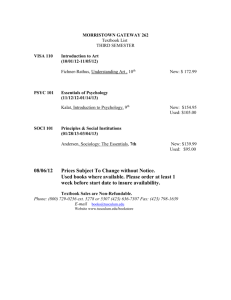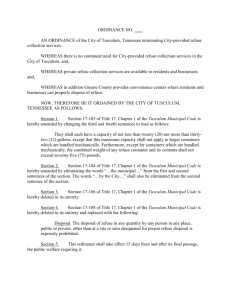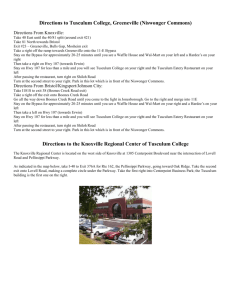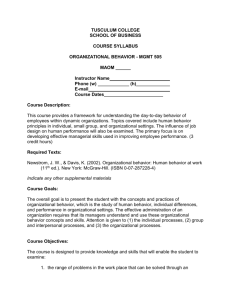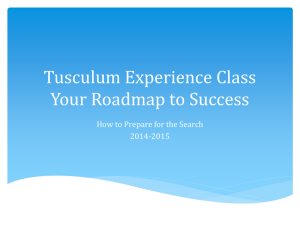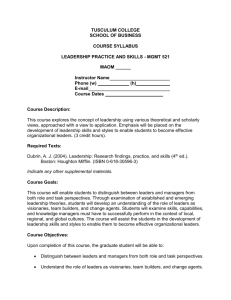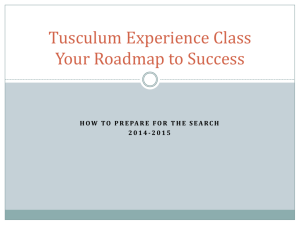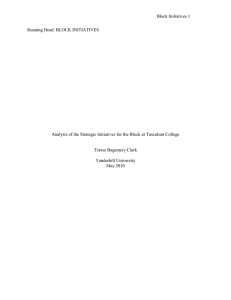The Nuts and Bolts of Living Learning Communities
advertisement
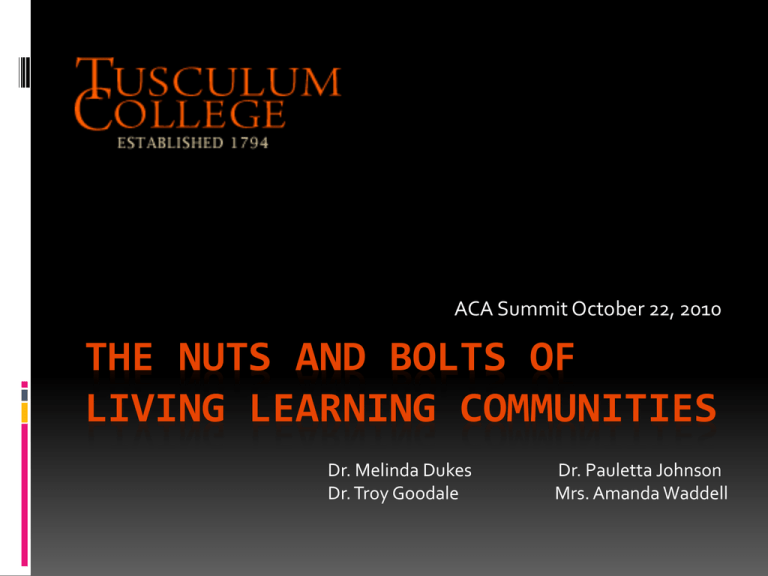
ACA Summit October 22, 2010 THE NUTS AND BOLTS OF LIVING LEARNING COMMUNITIES Dr. Melinda Dukes Dr. Troy Goodale Dr. Pauletta Johnson Mrs. Amanda Waddell Mission Tusculum College provides a liberal arts education in a Judeo-Christian and civic arts environment. Vision Tusculum College will be known throughout the midSouth for its adherence to Judeo-Christian values, its allegiance to the liberal arts, and its avenues for career preparation and civic engagement, all delivered through innovative course structures and personal attention from outstanding faculty LEARNING COMMUNITIES OVERVIEW Tusculum College LLC Program Mission The Living-Learning Community Program seeks to enhance the institutional commitment of participating first-time freshmen by providing an academically and socially enriched environment Program Goals •Students experience an enhanced transition to college life •Students report a higher degree of academic integration •Students report an enhanced sense of social integration “Student success does not arise by chance” Vincent Tinto INDICATORS FOR LEARNING COMMUNITIES AT TUSCULUM COLLEGE Supportive Campus Environment Students perform better and are more satisfied at colleges that are committed to their success and cultivate positive working and social relations among different groups on campus Providing the support you need to help you succeed academically Helping you cope with your non-academic responsibilities Providing the support you need to thrive socially OVERVIEW OF TUSCULUM COLLEGE LEARNING COMMUNITY PROGRAM Murdock Circle Patton Society Quest Hurley Society •A Living Learning Community for students interested in Social Science and Humanities •ACT English subscore 2025, SAT verbal subscore 460-590 •2010 Theme: Leadership •56.3% Retention Rate •Learning Community for students majoring in education licensure areas •High school GPA 2.75/4.0 •2010 Theme :Teaching as Service •72.2% Retention Rate •Learning Community for conditionally admitted students •ACT English subscore 19 or below, SAT verbal 450 or below and ACT Math subscore 18 or below, SAT subscore 450 or below •2010 Theme: Quest for Success •50% Retention Rate •A Living learning community for students who are SSS eligible •ACT composite of 20 •Qualify for SSS •Undecided major •2010 Theme: Students’ Search for Self •80% Retention Rate 2009-10 Satisfaction Survey Summary •Are you satisfied with the outside of class academic activities presented by the faculty in your Learning Community? •Are you satisfied with the non-academic activities provided by the Learning Community program? •Are you satisfied with the academic and social support provided by the peer mentor(s) in your Learning Community? •Are you satisfied, overall, with the Learning Community program? Learning Communities Combined Retention Rate 65.7% Tusculum College Overall Retention Rate 58% QUESTIONS TO PONDER FOR YOUR OWN INSTITUTION Is there a fit for learning communities (LC’s) with the overall institution mission? What would be the academic objectives and mission of the communities? Is there institutional investment capacity for LC’s or living learning communities (LLC’s)? Is there faculty and staff capacity for LC’s? Murdock Circle Dr. Troy Goodale, Amanda Waddell Peer Mentor: Amber Sharp Leadership Thematic •Tusculum Experience •Composition and Rhetoric •Comparative Government •U.S. History, Creative Writing, Environmental Science •Physical Fitness and Wellness •Service Project •Weekly Group Meetings Hurley Society •Student Support Services/Federal TRiO programs •Theme: Career Exploration: Students’ Search for Self •Undeclared majors •Environmental Science Immersion Quest Quest: Achieving Full Potential •Jeannette Walls’ memoir, The Glass Castle •English, Math and Environmental Science •West Virginia Coal Mining •Concord University Patton Society Living Learning Community (2008-9) and Learning Community (2009-2011) Diversity in Educationexplore diverse cultures with the students at a local elementary school Teaching as ServiceTusculum College Mentoring for Kids program QUESTIONS TO PONDER FOR TUSCULUM AND YOUR OWN INSTITUTION Is there a fit for learning communities (LC’s) with the overall institution mission? What would be the academic objectives and mission of the communities? Is there institutional investment capacity for LC’s or living learning communities (LLC’s)? Is there faculty and staff capacity for LC’s? IS THIS A PRACTICAL OPTION? IF SO, WHERE DO WE BEGIN??? A bit of advice… Funding, Funding, Funding… Student Selection Peer Mentors Faculty/Staff Mentors
